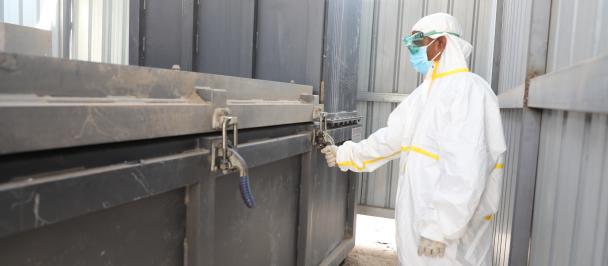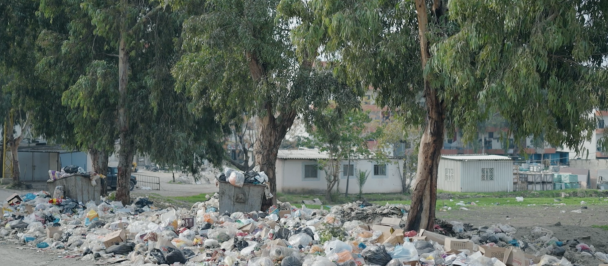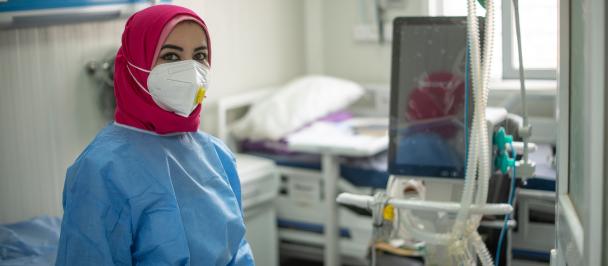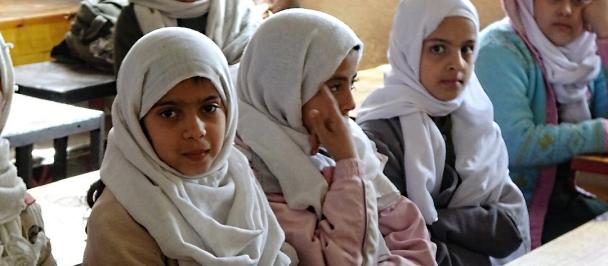Photo credit: UNDP Yemen/2020
The west coast city of Hodeidah has been severely impacted by the six-year war. Home to the country’s principal seaport, the city’s key basic services – including waste disposal and electricity – have been badly affected by the clashes. The city is plagued by high levels of unemployment and, worse still, the inability to safely dispose of waste is causing the rampant spread of deadly diseases like dengue and malaria.
Hodeidah produces over 350 tons of waste each day – or 990 cubic metres – but with limited capacity, the city’s waste management authorities can only remove half of it. Without the regular and safe removal of household and industrial waste, it builds up and fills the streets with dangerous obstacles that citizens must carefully navigate on their daily journeys.
To clean up the streets of the city, between May and December 2019, UNDP employed nearly 6,100 people: 3,650 from the local community and 2,450 from the District Cleaning Fund (DCF). Approximately 17,000 tons of solid waste was removed, transported, and dumped in a nearby landfill.
“I hope initiatives like this continue. It really helped me take care of my wife and two kids,” says Abduallah Yahya, another cleaner hired through the cash-for-work clean-up project.
To assist in this massive operation, maintenance and spare parts were provided for 44 garbage trucks, as well as 18,700 litres of fuel and engine oil. Additionally, 14 motorbikes and 50 mobile garbage trolleys were provided to support the DCF’s collection system, helping remove waste from the city and restore the mobility for the city’s almost 3.3. million people.
Despite these efforts, however, the city continues to suffer from the failure of critical services and solid waste management remains a recurring problem.
So what can be done?
In 2020, UNDP developed an innovative project to not only dispose of solid waste, but to use that waste to provide much needed electricity. This will help ensure safer and cleaner energy for the community, as well as reduce the waste left in the streets which often results in disease epidemics.
The project will tackle three key problems in conflict affected Hodeidah.
- Job opportunities will be created for the city’s most vulnerable people, helping them survive and gain invaluable skills during a very difficult period.
- The solid waste will be reused to create vital energy for the city, an environmentally friendly way to create renewable energy.
- The community, private sector, and governments will be encouraged to fast-track solutions for livelihoods and environmental sustainability that are both innovative and sustainable.
“I felt positive! This work helped me secure income to cover the cost of fuel, food, and other essential goods for my family,” explains 37-year-old Omar. He fled his home during the conflict and moved his family to Hodeidah. Omar has not been able to find regular work since his relocation and was barely making ends meet. This project changed his life – the money he has made has helped him regularize his income and put food on his table for his family.
In December 2018, after more than two years of stalemate, the Special Envoy of the Secretary-General for Yemen convened intra-Yemeni consultations in Sweden. The consultations successfully concluded with agreements of the redeployment of forces from the city of Hodeidah and port, as well as establishing a leading UN role in the oversight of the port management and port resources. In support of the peace agreement, UNDP’s sub-office in Hodeidah has developed projects with a focus on Mine Action, Rule of Law, and recovery.

 Locations
Locations




